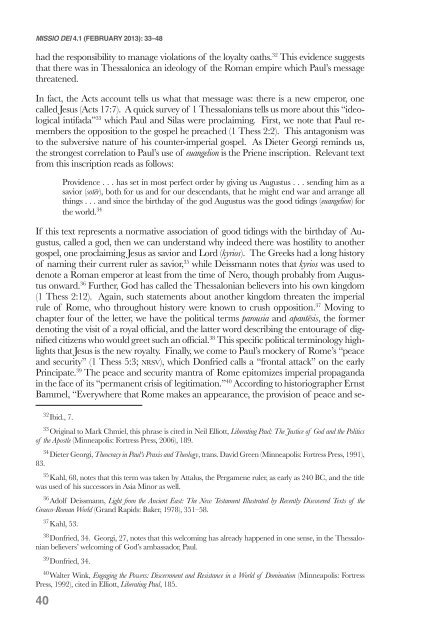VULNERABLE MISSION
VULNERABLE MISSION
VULNERABLE MISSION
You also want an ePaper? Increase the reach of your titles
YUMPU automatically turns print PDFs into web optimized ePapers that Google loves.
MISSIO DEI 4.1 (FEBRUARY 2013): 33–48<br />
had the responsibility to manage violations of the loyalty oaths. 32 This evidence suggests<br />
that there was in Thessalonica an ideology of the Roman empire which Paul’s message<br />
threatened.<br />
In fact, the Acts account tells us what that message was: there is a new emperor, one<br />
called Jesus (Acts 17:7). A quick survey of 1 Thessalonians tells us more about this “ideological<br />
intifada” 33 which Paul and Silas were proclaiming. First, we note that Paul remembers<br />
the opposition to the gospel he preached (1 Thess 2:2). This antagonism was<br />
to the subversive nature of his counter-imperial gospel. As Dieter Georgi reminds us,<br />
the strongest correlation to Paul’s use of euangelion is the Priene inscription. Relevant text<br />
from this inscription reads as follows:<br />
40<br />
Providence . . . has set in most perfect order by giving us Augustus . . . sending him as a<br />
savior (sotēr), both for us and for our descendants, that he might end war and arrange all<br />
things . . . and since the birthday of the god Augustus was the good tidings (euangelion) for<br />
the world. 34<br />
If this text represents a normative association of good tidings with the birthday of Augustus,<br />
called a god, then we can understand why indeed there was hostility to another<br />
gospel, one proclaiming Jesus as savior and Lord (kyrios). The Greeks had a long history<br />
of naming their current ruler as savior, 35 while Deissmann notes that kyrios was used to<br />
denote a Roman emperor at least from the time of Nero, though probably from Augustus<br />
onward. 36 Further, God has called the Thessalonian believers into his own kingdom<br />
(1 Thess 2:12). Again, such statements about another kingdom threaten the imperial<br />
rule of Rome, who throughout history were known to crush opposition. 37 Moving to<br />
chapter four of the letter, we have the political terms parousia and apantēsis, the former<br />
denoting the visit of a royal official, and the latter word describing the entourage of dignified<br />
citizens who would greet such an official. 38 This specific political terminology highlights<br />
that Jesus is the new royalty. Finally, we come to Paul’s mockery of Rome’s “peace<br />
and security” (1 Thess 5:3; nrSv), which Donfried calls a “frontal attack” on the early<br />
Principate. 39 The peace and security mantra of Rome epitomizes imperial propaganda<br />
in the face of its “permanent crisis of legitimation.” 40 According to historiographer Ernst<br />
Bammel, “Everywhere that Rome makes an appearance, the provision of peace and se-<br />
32 Ibid., 7.<br />
33 Original to Mark Chmiel, this phrase is cited in Neil Elliott, Liberating Paul: The Justice of God and the Politics<br />
of the Apostle (Minneapolis: Fortress Press, 2006), 189.<br />
83.<br />
34 Dieter Georgi, Theocracy in Paul’s Praxis and Theology, trans. David Green (Minneapolis: Fortress Press, 1991),<br />
35 Kahl, 68, notes that this term was taken by Attalus, the Pergamene ruler, as early as 240 BC, and the title<br />
was used of his successors in Asia Minor as well.<br />
36 Adolf Deissmann, Light from the Ancient East: The New Testament Illustrated by Recently Discovered Texts of the<br />
Graeco-Roman World (Grand Rapids: Baker, 1978), 351–58.<br />
37 Kahl, 53.<br />
38 Donfried, 34. Georgi, 27, notes that this welcoming has already happened in one sense, in the Thessalonian<br />
believers’ welcoming of God’s ambassador, Paul.<br />
39 Donfried, 34.<br />
40 Walter Wink, Engaging the Powers: Discernment and Resistance in a World of Domination (Minneapolis: Fortress<br />
Press, 1992), cited in Elliott, Liberating Paul, 185.


